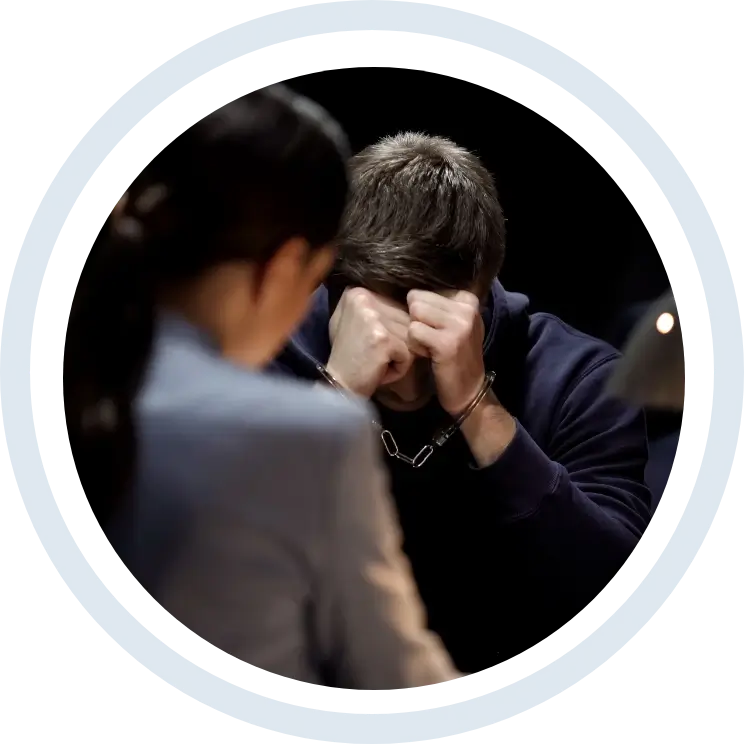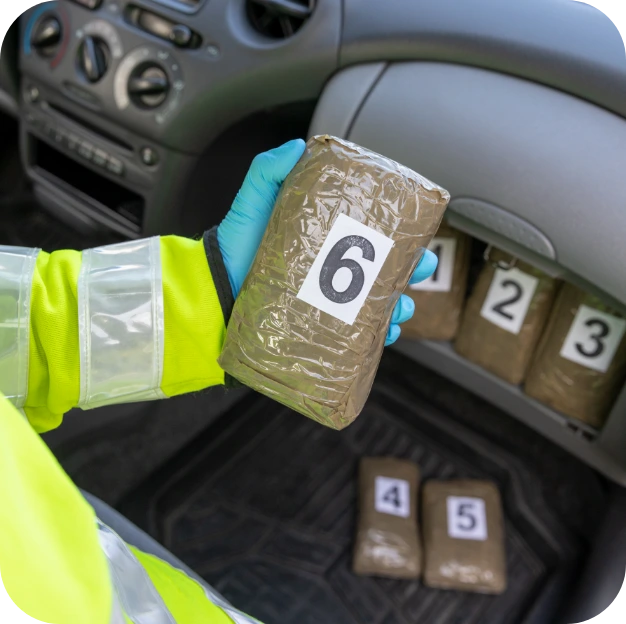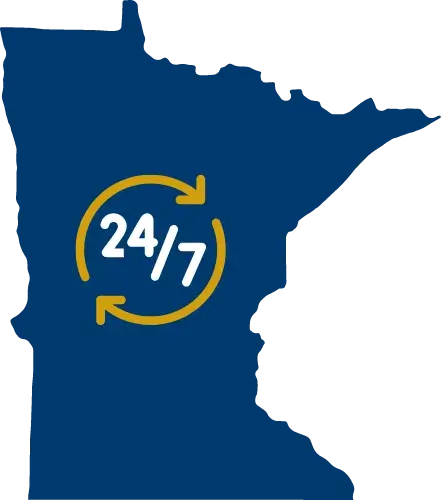Minneapolis Drug Crime Lawyers
Powerful Criminal Defense to Protect Your Future
Were you arrested for a drug crime in Minneapolis, Bloomington, or St. Paul? A strong criminal defense can make all the difference in the outcome of your case. The drug crime lawyers at Keller Criminal Defense Attorneys have more than 25 years of experience in criminal law. We have successfully defended hundreds of cases in numerous jurisdictions.
Let our law firm help you stay out of jail.
Table of Contents

Why Do You Need an Experienced Minneapolis Drug Crime Attorney On Your Side?
Drug charges are serious business in Minnesota. If you were arrested in Minneapolis, St. Paul, or one of the surrounding communities, you need an experienced drug crime lawyer on your side to protect your rights, your freedom, and your future.
Although front page headlines about the “war on drugs” have slowly begun to decline in recent years, Minnesota continues to enforce strict laws that govern the possession, use, purchase, manufacture, or sale of controlled substances. Despite stricter laws, however, drug busts for fentanyl, opiate, and methamphetamine offenses may just be at an all-time high.
More than 80% of drug-related arrests in Hennepin County involve simple drug possession. Without an experienced criminal defense lawyer on your side, even a relatively minor drug offense can carry heavy penalties. You may be facing steep fines, long-term monitoring, rehab, and incarceration.
Call Today (952) 913-1421
The Consequences of a Conviction for a Gross Misdemeanor or Felony Drug Crime May Be Severe
If you have been charged with a more serious offense, like drug trafficking, manufacturing, or distributing a controlled substance in Minnesota, you’re going to need a top drug crime lawyer in your corner from the start.
Without a drug crime defense attorney to handle your case, everyday life as you know it could soon be a distant memory.
- You could be handed a lengthy jail or prison sentence that takes you away from your family.
- Significant fines and related expenses could soon be draining your savings account.
- You could lose your professional license and your ability to excel in your career.


Why Hire Our Minneapolis Drug Crime Lawyers?
Criminal defense attorney Max Keller, the founding attorney of Keller Criminal Defense Attorneys, brings a unique advantage to the table in drug crime cases. For roughly five years, Max served as a prosecutor for the Attorney General’s Office in Minnesota. During this time, he became familiar with the tactics used by the other side to put alleged defendants behind bars. Pledging to defend the people of Minnesota, Max learned to anticipate the State’s legal strategies and prepare for them.
Max soon joined forces with Barry S. Edwards, another top criminal defense attorney in Minneapolis, to help strengthen his defense team even more. Mr. Edwards brings approximately two decades of extensive negotiation and litigation experience to the law firm.
As members of the Minnesota Society for Criminal Justice (MSCJ), Max and Barry are among the best criminal defense attorneys in the state.
Get Drug Charges Dropped in Minnesota
There are various ways that our attorneys may be able to help you get your drug charges reduced or eliminated altogether. To help you beat your drug charge, our team will look for:
- Loopholes in Minnesota drug crime laws
- Violations of your rights
- Procedural mistakes
- Testing inaccuracies
We will also look for additional weaknesses in the State’s case, and use them to your advantage.
For drug charges to stick in Minnesota, the burden of proof is on the prosecutor. He or she must present the illegal substance or paraphernalia in court, and prove that it is illegal. The prosecutor must also prove all elements of possession, manufacture, intent to sell, etc. beyond a reasonable doubt.
Challenging the Admissibility of the Evidence
Under the Fourth Amendment of the United States Constitution, unreasonable searches and seizures by law enforcement are prohibited. If the officers did not have a valid search warrant or express permission to perform the search that revealed the evidence, and the evidence was not in plain view, it may have been obtained illegally. Any evidence that was obtained through an illegal search is not admissible in court.
Challenging Drug Possession
To convict you of drug possession or possession of paraphernalia, the State must prove that you knew about the substance or object, and that you had control over it. If the evidence in question was discovered inside a home, on a property, or inside a motor vehicle, many vulnerabilities may exist in the prosecution’s case. If other people were occupying the area where the illegal drugs or paraphernalia were found, this can complicate a drug possession case even further.
Challenging Intent
Circumstantial evidence, like a large quantity of cash, guns, scales, packaging items, or drugs, can turn a simple drug possession charge into intent to sell. To make charges stick, the prosecution will attempt to draw a connection between the circumstantial evidence and your drugs or paraphernalia. They may even involve multi-agency investigators or confidential informants. Our team may be able to cast doubt in the credibility of informants, especially if they are paid. We may also be able to uncover errors in the investigation.
Challenging the Legality of the Substance or Paraphernalia
The prosecution must also prove to the Court that the substance or object in question is illegal. To do this, the State often presents test results as evidence. This opens the door to various vulnerabilities. Our attorneys may be able to challenge the prosecution’s claims based on erroneous testing procedures, faulty tests, or even scientific proof that the test results are not accurate.
If a substance was field tested and came back positive for a controlled substance, even better. Numerous cases have demonstrated how unreliable field-testing can be. In one case, for instance, a substance allegedly field-tested positive for cocaine. Further testing, however, proved the substance was in fact bird feces.
Cases alleging the possession of marijuana can be especially complicated. For starters, medical marijuana has been legal in Minnesota since 2014, and various types of products that contain THC are also legal as long as they are below THC limits and the THC is derived from hemp. To distinguish illegal marijuana products from hemp, a THC content test must be performed. This can be expensive and time-consuming for the prosecution.
Miranda Rights Violations
If you were placed under arrest, and you were not read your Miranda rights and informed about your Fifth Amendment right to remain silent, any statements you made may be able to be suppressed. Additionally, if you exercised your right to an attorney by informing police that you wished to consult with a lawyer, and they continued to question you, any statements you made will likely be inadmissible in court.
Showing Entrapment
Were you “set up” by law enforcement? Federal entrapment standards exist to protect innocent people from becoming enticed or coerced by law enforcement to commit a crime so that police can obtain evidence to prosecute the person. Unfortunately, entrapment is still common in stings involving drugs and prostitution. In drug cases, these sting operations often involve undercover police who pose as buyers or sellers. Bribery tactics, fencing, and solicitation by undercover police are common.
While law enforcement are allowed to employ certain tactics to entice people to commit or admit to a crime, these tactics are limited. The law prevents the prosecution or punishing of defendants who would probably not have committed the crime if they had not been lured by the police.
What Are the Minnesota Drug Crime Classifications?
Various levels of drug crimes exist in Minnesota. They range from minor drug charges, like possession of a smaller amount of marijuana, to more serious charges, like felony drug crimes with enhancements. The severity of a drug charge depends on:
- The type of controlled substance
- The amount of the substance
- Alleged intent
- Prior convictions for drug offenses
Non-Felony Drug Crimes
The penalties for misdemeanor and gross-misdemeanor drug crime convictions are not nearly as severe as those for higher-level, felony offenses. Convictions often come with collateral damages unexpected consequences, like the loss of career opportunities, driving privileges, or federal student loan eligibility, however.
Non-felony drug crimes in Minnesota include:
- Possession of 42.5 grams or less of marijuana
- Possession of drug paraphernalia
- Possession of less than 0.25 grams or one dosage unit of a controlled substance that is not heroin, first conviction
- Possession of less than 0.05 grams of heroin, first conviction
Amazing work done by max, professional and very informative. Told me exactly what I need to do and how to do it, highly recommend this law firm
Felony Drug Crime Penalties in Minnesota
First Degree
- Possession of a narcotic mixture weighing 50 grams, or 25 grams if the person is in possession of a firearm, and containing meth or cocaine
- Possession of a heroin mixture weighing 25 grams
- Possession of a narcotic mixture that is not cocaine, meth, or heroin, weighing 500 grams
- Possession of a mixture weighing 500 grams or having 500 dosage units and containing PCP, amphetamine, or a hallucinogen
- Possession of 500 marijuana plants or 50 kilograms of marijuana
- Sale of a cocaine or meth mixture weighing 17 grams, or 10 grams if the person is in possession of a firearm
- Sale of a heroin mixture weighing 10 grams
- Sale of a narcotic mixture that is not heroin, meth, or cocaine, weighing 50 grams
- Sale of an amphetamine, PCP, or hallucinogen mixture weighing 50 grams or including 200 dosages
- Sale of 25 kilograms of a marijuana mixture
Second Degree
- Possession of a narcotic mixture weighing 25 grams and containing cocaine or meth (10 grams if the person is in possession of a gun)
- Possession of a narcotic mixture that is not cocaine, meth, or heroin, weighing 50 grams
- Possession of a heroin mixture weighing at least 10 grams
- Possession of at least 50 grams or 100 dosage units of a mixture containing amphetamine, PCP, or a hallucinogen
- Possession of a marijuana mixture weighing at least 25 kilograms
- Sale of a cocaine or meth mixture weighing 10 grams (or 3 grams if the person is in possession of a firearm)
- Sale of a heroin mixture weighing 3 grams
- Sale of a narcotic drug mixture weighing 10 grams, excluding meth, cocaine, or heroin
- Sale of a marijuana mixture weighing 10 kilograms
- Sale of a mixture weighing 10 grams or containing 50 dosage units and containing amphetamine, PCP, or a hallucinogen
- Sale of Schedule I or II narcotics to someone under 18
- Sale of a Schedule I or II narcotic, or meth, amphetamine, or over 5 kilograms of marijuana in a drug-free zone
- Hire or conspire with someone under 18 to sell a Schedule I or II narcotic
Third Degree
- Possession of a mixture weighing 3 grams, containing cocaine, heroin, or meth
- Possession of a mixture weighing 10 grams, containing a narcotic other than meth, heroin, or cocaine
- Possession of a narcotic mixture that is in dosage units of 50 or more
- Possession of a marijuana mixture weighing 10 kilograms
- Possession of a mixture that contains meth in a drug-free zone
- Sale of a narcotic
- Sale of PCP packaged in 50 or more dosages
- Sale of a Schedule I, II, III controlled substance that is not a narcotic to someone under 18
- Sale of a mixture weighing 5 kilograms and containing marijuana
- Hire or conspire with someone under 18 to sell a Schedule I, II, or III substance, except Schedule I or II narcotics
Fourth Degree
- Possession of a hallucinogen packaged in dosage units, equaling 10 or more units
- Possession of a mixture containing a Schedule I, II, or III controlled substance, except for marijuana, with intent to sell
- Sale of any mixture containing a Schedule I, II, or III controlled substance that is not marijuana
- Sale of a mixture containing a Schedule Iv or V controlled substance to someone under 18
- Sale of marijuana in a drug-free zone
- Hire or conspire with someone under 18 to sell a Schedule Iv or V controlled substance
Fifth Degree
- Unlawful possession of one or more controlled substances, except a small amount of marijuana
- Attempt to procure, control, or possess a controlled substance with fraudulent intent
- Sale of Schedule IV substance, except a small amount of marijuana
Aggravated Felony Drug Crimes
Additionally, you may be charged with an aggravated first degree drug crime in Minnesota if your alleged offense involves the sale or possession of 100 or more grams of meth, cocaine, another narcotic, heroin, or a hallucinogen, or 200 or more dosage units of PCP, an amphetamine, or a hallucinogen, and two or more aggravating factors are present.
Aggravating factors may include, but are not limited to, the possession of a gun, selling to someone under 18, prior convictions, and benefitting a gang.
Drug Crime Enhancements
If the offense was allegedly committed in a drug-free zone in Minnesota, your penalties may be significantly more severe if you are convicted. Drug-free zone enhancements involve offenses that happen in:
- Schools: If your charges involve a school zone, charges cannot be enhanced unless children were present at the school when the crime allegedly happened.
- Drug Treatment Facilities: Your penalties may be enhanced if you are convicted of a crime in the zone of a stand-alone drug treatment medical facility.
- Public Parks: Drug crime penalties may also be enhanced if the crime allegedly happened in a public park zone. Privately-owned parks do not count for enhancement purposes.
Alternatives to Incarceration in Drug Crime Cases
If you were arrested and charged with a gross misdemeanor or felony drug crime in Minnesota, calling our awyers may be the most important call you’ll ever make. If we can’t get your drug charges dropped completely, we may be able to help you get your charges reduced or set aside. Additionally, a wide range of alternatives to incarceration may be available to you.
Drug Court
In recent years, Minnesota has acknowledged that many drug offenders are not necessarily criminals. Instead, they suffer from addiction. As a result, drug courts were established to provide people with an alternative to serving time behind bars. Drug courts aim to rehabilitate people who are addicted to drugs and reduce the number of repeat offenses.
Incarceration alone is not an effective solution to reduce drug crimes in Minnesota. Drug courts provide people with intensive treatment for their addiction. If you suffer from substance abuse problems, and you were charged with a drug crime, you may be able to take advantage of this alternative to jail time. Drug courts vary by jurisdiction, but typically include long-term treatment programs (lasting 12 months or longer), rigorous drug testing schedules, monitoring and evaluation of progress, and counseling.

Sentence to Service
The Sentence to Service program in Minnesota benefits non-violent drug offenders and their communities. In lieu of jail time, select offenders enter the work program to complete community projects. Like other alternatives to incarceration, Sentence to Service programs vary with jurisdiction.
In Hennepin County, select offenders may be offered the opportunity to provide community services for a set amount of time as a condition of their sentencing. Those who enter the program sign up to work four-hour (half day) shifts, or eight-hour (full day shifts). They are assigned projects in their county. Examples of types of projects in Hennepin County include landscaping projects, cleaning up litter and graffiti, planting, trimming, and pruning trees, playground equipment assembly, janitorial services, and snow removal.
Electronic Home Monitoring
Often referred to as “house arrest”, electronic monitoring is another alternative to jail time in Minnesota. Participants wear a bracelet on their ankle that monitors their location 24 hours a day. In most cases, people who are subject to electronic home monitoring will be allowed to go to work, school, and court appearances.
The electronic monitoring program is beneficial to offenders, their families, businesses, and the State. It helps control overcrowding in Minnesota prisons. The program enables offenders to go to work and provide for their families. Finally, it provides first time or low-level offenders with a second chance to take control of their lives.


Arrested in Minnesota? A Minneapolis Drug Crime Lawyer at Keller Criminal Defense Attorneys Can Help
Available 24/7, our attorneys defend the people of Minneapolis, St. Paul, Andover, Apple Valley, Blaine, Bloomington, Burnsville, Champlin, Chaska, Coon Rapids, Eagan, Edina, Eden Prairie, Lakeville, Maple Grove, Minneapolis, St. Louis Park, Plymouth, Roseville, Woodbury, and White Bear Lake, and throughout Hennepin County, Ramsey County, Anoka County, and Dakota County, and other cities and counties throughout Minnesota.
Call Today (952) 913-1421
